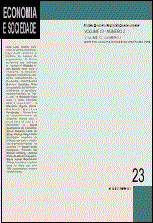Resumo
Os modelos mais relevantes da teoria econÙmica da regulaÁ„o s„o revistos criticamente neste trabalho, sendo apontadas as inconsistÍncias entre os resultados teÛricos e a falta de suporte empÌrico de car·ter decisivo para esses modelos, apontando-se a necessidade de se considerar a autonomia do regulador perante os grupos de interesse e o contexto institucional.
Abstract
The most important models from regulation economic theory are critically reviewedin this paper. It is shown that the results presented by these models are reciprocally inconsistent and lack decisive empirical support, and that regulatorís autonomy from interest groups as well as the institutional context which supports regulation deserve more research.
Key words: Regulation. Interest groups. Industrial policy
Referências
BECKER, Gary. A theory of competition among pressure groups for political influence. Quarterly Journal of Economics, Cambridge, Mass., v. 98, n. 3, p. 371-400, Aug. 1983.
BREZIS, Elise S.; WEISS, Avi. Conscientious regulation and post-regulatory employment restrictions. European Journal of Political Economy. Amsterdam, v. 13, n. 3, p. 517-536, Aug. 1997.
DERTHICK, Martha; QUIRCK, Paul J. The politics of deregulation. Washington: The Brookings Institute, 1985.
DIXIT, Avinash K. The making of economic policy: a transaction-cost politics perspective. Cambridge, Mass.: The MIT Press, 1996.
ESTACHE, Antonio; MARTIMORT, David. Politics, transaction costs, and the design of regulatory institutions. World Bank Governance Papers, Washington, DC, n. 2.073, Mar. 1999.
HALL, Clare; SCOTT, Colin; HOOD, Christopher. Regulation: culture, chaos and interdependence inside the regulatory process. London: Routledge, 2000.
HORWITZ, Robert B. The irony of regulatory reform: the deregulation of American telecommunications. New York: Oxford University Press, 1989.
JOSKOW, Paul L.; NOLL, Roger C. Regulation in theory and practice: an overview. In: FROMM, Gary. Studies in public regulation. Cambridge, Mass.: The MIT Press, 1981.
KALT, Joseph P.; ZUPAN, M. A. Capture and ideology in the economic theory of politics. American Economic Review, Princeton, NJ, v. 74, n. 3, p. 279-300, Jun. 1984.
LAFFONT, Jean-Jacques; MARTIMORT, David. Separation of regulators against collusive behavior. Rand Journal of Economics, Santa Monica, CA, v. 30, n. 2, Summer 1999.
________; TIROLE, Jean. A theory of incentives in procurement and regulation. Cambridge, Mass.: The MIT Press, 1993.
________. The politics of government decision-making: a theory of regulatory capture. The Quarterly Journal of Economics, Cambridge, Mass., v. CVI, n. 4, p. 1089-1027, Nov. 1991.
MACAVOY, Paul W. Industry regulation and the performance of the American economy. New York: W. W. Norton & Co., 1992.
MARTIMORT, David. The life cycle of regulatory agencies: dynamic capture and transaction costs. Review of Economic Studies. London, v. 66, n. 4, p. 929-947, Oct. 1999.
NEWBERY, David M. Privatization, restructuring, and regulation of network utilities.Cambridge, Mass.: The MIT Press, 1999.
NOLL, Roger G. Economic perspectives on the politics of regulation. In: SCHMALENSEE, R.; WILLIG, Robert D. (Ed.). Handbook of industrial organization. Amsterdam: North-Holland, 1989. v. 2.
OLSON, Mancur. The logic of collective action. Cambridge, Mass.: Harvard University Press, 1965.
PELTZMAN, Sam. Toward a more general theory of regulation. The Journal of Law and Economics, Chicago, v. 19, p. 211-240, 1976. [Reimpresso em STIGLER, George J. (Ed.). Chicago studies in Political Economy. Chicago: The University of Chicago Press, 1988].
________. The economic theory of regulation after a decade of deregulation. Brooking Papers on Economic Activity 1989: Microeconomics. Washington, DC: The Brooking Institution Press, 1989.
POSNER, Richard A. Taxation by regulation. Bell Journal of Economics and Management Science, New York, v. 2, n. 1, p. 22-52, Spring 1971.
________. Theories of economic regulation. Bell Journal of Economics and Management Science. New York, v. 5, n. 3, p. 335-358, Fall 1974.
SPILLER, Pablo T. Politicians, interest groups, and regulators: a multiple-principals agency theory of regulation, or ìlet them be bribedî. The Journal of Law and Economics, Chicago, v. 33, n. 1, p. 65-101, Apr. 1990.
STIGLER, George J. The theory of economic regulation. Bell Journal of Economics and Management Science, New York, v. 2, n. 1, p. 1-21, Spring 1971.
VOGEL, Steven K. Freer markets, more rules. Ithaca, NY: Cornell University Press, 1996.
A Economia e Sociedade utiliza a licença do Creative Commons (CC), preservando assim, a integridade dos artigos em ambiente de acesso aberto.

